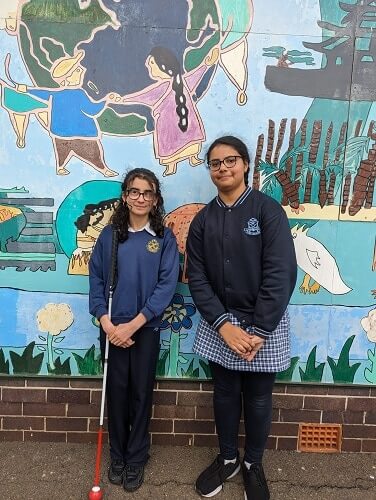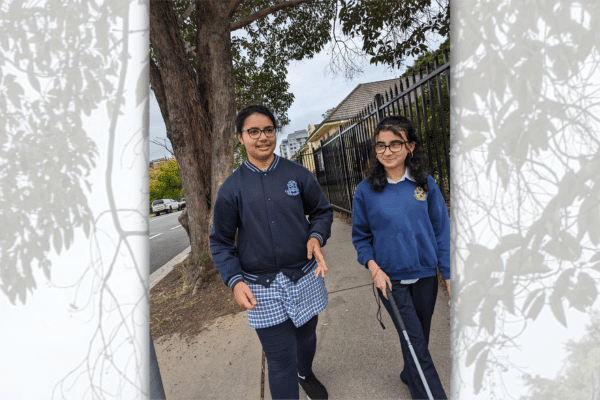Ever since I met Haya Dagher in Year 3, I’ve been incredibly curious about her. At first, I wondered why she needed to use special equipment and have a guiding stick, as well as why all her writing was in dots. We spent precious time together, talking, playing, and studying, and I went from being an acquaintance to a classmate to a friend. Now, I’m a silent cheerleader for her.
She introduced me to The Series of Unfortunate Events which became my favorite book and Netflix series. It’s a gripping tale of three siblings who use their talents to defeat the antagonist. When Haya told me about it, I was hooked. I now realise how well the three siblings combined reflect Haya’s personality.
Haya has strong willpower, inspiring sincerity, and affectionate charm. The more time I spend with her, the more exceptional, empathetic, humorous, and resilient I learn she is. I can think of no better time to share her story than for disability month. I continue to be in awe of her, and I hope you will too.

Shalom Bhaskar: When you first started primary school, what challenges did you face?
Haya Dagher: I started primary school overseas and moved to Australia when I was 6. I found it challenging to make new friends and start all over again. When I was overseas, I went to a private school for students with disabilities, so everyone knew about my condition. Coming to Australia and explaining my disability to others was challenging as many people hadn’t encountered someone with a disability before.
Shalom Bhaskar: How did you become visually impaired?
Haya Dagher: When my mother was pregnant, my eye nerves didn’t fully develop, and nobody knows why. My condition is referred to as Coloboma.
Shalom Bhaskar: How do you do schoolwork? Is it all in Braille? How do you use a computer?
Haya Dagher: Since starting high school, I haven’t received much work on Braille paper, except for Maths graphs.
I have a Braille device called the ‘Braille Sense 6’. It’s basically a Braille version of a computer which lets me work without looking at a screen. It reads long passages out to me which also saves my eyes from fatigue. I also use my iPad and laptop, which have accessibility shortcuts allowing me to zoom in and navigate my work efficiently.
Shalom: How did you overcome these challenges? Did you receive support?
Haya: In many circumstances, I’ve received support from disability services, teachers and sometimes my peers. Recently, I’ve learnt most of the problems that come my way are in my hands and it’s up to me to solve them rather than ask for advice.

Shalom: How does it feel to have so many accomplishments? Of all your achievements, what are you most proud of?
Haya: When I achieve something, I feel proud and motivated to achieve more and train harder.
Going to the nationals athletics championship in 2022 is my biggest achievement, it’s a memory that will stick with me forever.
Shalom: Do you feel you voice the words that numerous visually impaired people couldn’t?
Haya: I have voiced a few things, but I’m young. I’m still learning and growing, and I look forward to speaking up for people with disabilities when I’m older as more problems come my way.
Shalom: You’re an accomplished state level athlete. What are some adjustments you’ve had to make?
Haya: Being visually impaired, it’s challenging for me to run on a track without guidance. This is why a guide runner helps me – it’s their job to be my eyes when I am in a race.
In my 100 and 200 metre races, the guide runner stops me from going out of my lane and tripping over. They also tell me how much of the race I have done and how much I have left.
Shalom: This year you started high school. Has your school accommodated you well?
Haya: The teachers at my high school have done a good job at making everything accessible for me. Like all humans, sometimes they make mistakes, but they always learn from them.

Shalom: What’s a common misconception about visually impaired people?
Haya: There’s a difference between treating me differently socially and visually.
Under certain circumstances, I need to be treated a bit differently, but only visually. Instead of people showing me something, they could describe it to me instead. That way, I can receive the same message as everyone else in the social environment. This isn’t the same as treating me differently socially.
Shalom: What frustrates you the most?
Haya: It frustrates me when people judge my personality based on my disability. People should understand that a disability is a condition, and a personality is someone’s features and character traits.
Shalom: What do you want to be when you grow up? What message would you like to give us?
Haya: To be honest, I haven’t decided on what I want to be yet. I’m still in the process of exploring different areas of work. Hopefully, by the time I get to Year 12, I’ll be an expert in whatever field I choose. For now, I’m trying to enjoy my childhood and explore anything that interests me.
I want people reading this to always strive for what they think is best for themselves and everyone around them. Always be thoughtful of others, but don’t forget about yourself.
READ ALSO: The Rainbow Brain: Celebrating Autism-ADHD individuals






